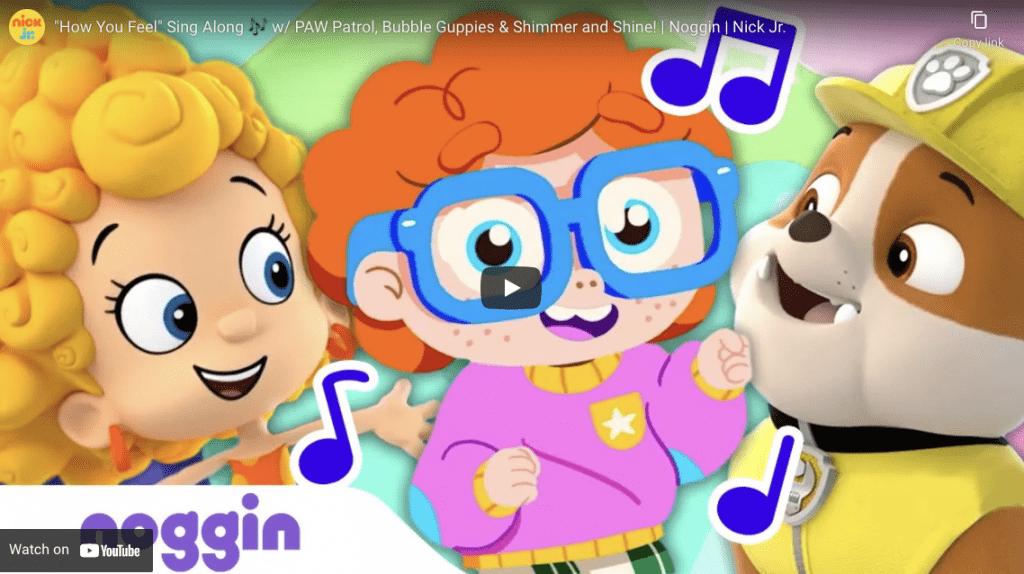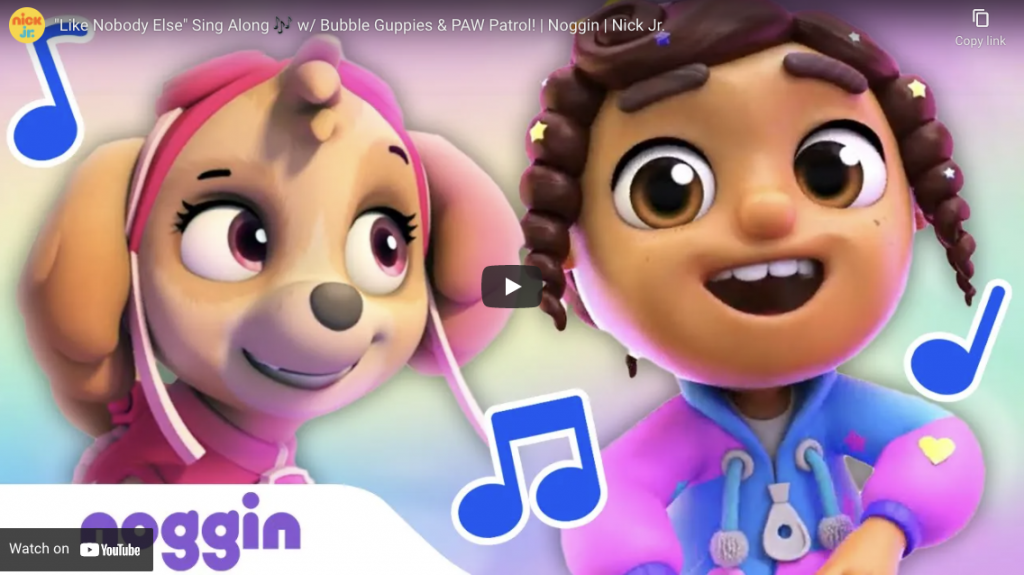Step One: Know Your Feelings
The Creators of “How You Feel” Advise Kids and Grown-Ups to Embrace ALL Their Feelings
Chris Sernel (a.k.a. Oh, Hush!) is a Grammy-nominated songwriter and producer, but he’s not all serious, all the time: He recorded the music for “How You Feel” for Noggin’s Big Heart Beats album entirely on his two- and four-year-old daughters’ toy instruments.
“I wanted to write a song that they would be able to connect with and enjoy,” he said in an interview. “I recorded the music using only Avalyn and Ayla’s toy instruments — melodica, toy piano, slide whistle, wood block, ukulele, etc.”
Sernel said he wants children like his own daughters to listen to the song and realize that people have a wide range of feelings, often in a single day or even in a single moment.
“Young kids experience a whole range of emotions (sometimes at the same time?!) and I wanted the song to capture that wide range of emotions and let them know that it’s okay to feel them,” he said, “It’s okay to feel those feelings, and express those feelings.”
His songwriting partner, Grayson DeWolfe, a multi-instrumentalist and producer, added, “I think kids can take away what feelings are and what they’re called — being able to identify what it is you’re feeling can be half the battle sometimes.”
Know Your Feelings
Grayson said it’s important to teach kids lifelong skills like compassion and empathy: “It’s really important to teach kids to be kind and understanding while they’re still learning, because they’re going to be our next generation of grown-ups soon enough.”
As a kid, he said he helped himself feel good by reminding himself that there’s nobody else in the whole world like himself who was on his same journey: “We are all uniquely special, and always will be.”
Chris said “being in touch with” your own feelings and others’ feelings is as important for children as it is for adults. As a child, Chris played the guitar and drums to create a “safe place” for himself. Today, he said, he uses journaling to explore his feelings.
“SEL [social and emotional learning] is important for everyone because it helps us to have compassion and empathy for other people and also ourselves,” Chris said.
Music Helps to Process Emotions
Chris said he remembers feeling “a bit silly and curious” about what it might sound like to record “How You Feel” on his daughters’ toy instruments.
In general, Chris and Grayson said, it can be “nerve-wracking” and “one-part exciting and one-part scary” to write a new song.
“I love the feeling of possibility that writing a new song brings,” Chris said. “But I’m also scared and a voice in my head sometimes asks, ‘What if you can’t come up with any good ideas? What if you write a bad song?’ I try to block out that voice and focus on the excitement of creating something new.”
Both said working with a teammate makes the process better — and improves the end result.
For both artists, expressing feelings is a big part of making music.
“For me, music is all about chasing those cool moments that make you feel something, whether that’s making you want to sing along or feel anything on the long range of emotions,” Grayson said. “And when I get lucky and make a moment that is truly and uniquely ME, I truly feel like I’m expressing myself.”
“A lot of times, music is just a great outlet for fun and positivity! That’s the way I feel a lot of the time,” Chris said. “Other times, I write songs and use music to help process other emotions I have. Fear, anxiety, love, optimism, sadness, they all have a place in my life and I’m able to help process those emotions by writing songs about those topics.”


Behind the scenes: Grayson singing in his studio and Chris playing on one of his children’s toy instruments.
Play How You Feel
Play, Dance, and Discuss to Help Children Learn The Song's Lessons
Feel the Rhythm!
Skills: Physical development, social and emotional development
How to Play:
Sing and dance along to the beat of “How You Feel.” Even babies will enjoy moving together as you dip, sway, and spin. Dancing together is a great way for families to build strong attachments and create warm memories — when their children are babies and as they grow.
Feelings Freeze Dance
Skills: social and emotional development, executive function
How to Play:
Play “How You Feel." Players should stop dancing and freeze like statues when the music stops! Stop-and-start games help children develop self-regulation skills — the ability to regulate your body and emotions. Children with strong self-regulation skills are better able to manage and express emotions, and transition easily from high to low energy activities.
Counting Feelings Words
Skills: Numbers and counting, social and emotional development
How to play:
The lyrics to “How You Feel” mention many different feelings. Listen together and count! How many feelings words can each of us count as we listen?
How You Feel-O-Meter
Skills: Social and emotional skills, Representation
How to Play:
Print out the Big Heart Feel-O-Meter and tape it to your refrigerator or somewhere else at home. Show your child how to place magnets or stickers along the bar to indicate what he or she is feeling, and how much! Use multiple magnets or stickers to show many feelings at once.
Big Heart Beats: How You Feel
Listen, Sing, Dance, and Play to Help Children Learn About Feelings
Lyrics to Noggin's "How You Feel"
HOW YOU FEEL
by Oh, Hush! and Grayson DeWolfe
Sometimes I feel happy
Like I could touch the sky
Sometimes I feel grumpy
So sad that I just sigh
Sometimes when I feel angry
I stop and count to ten
Makes it a lot less scary
When someone holds my hand
Happy or you’re sad
These emotions are for real
Anxious or real mad
It’s OK to feel
How you feel, hey!
It’s OK to feel how you feel
It’s OK to talk about you you’re
Feeling any day, oh in every way
How you feel
It’s OK to feel how you feel
Sometimes, I get nervous
My heart starts to dance
Sometimes I feel silly
Roll on the ground and laugh
Sometimes when I’m impatient
I stop and take a breath
But I’m always thankful
To know I have a friend
Worried or confused
These emotions are for real
When you’re asked “How are you?”
It’s OK to say how you feel.
How you feel, Hey!
It’s OK to feel how you feel
It’s OK to talk about how you you’re
Feeling any day, oh in every way
How you feel
It’s OK to feel
How you feel, hey!
It’s OK to feel how you feel
It’s OK to talk about how you’re
Feeling any day, oh in every way
How you feel, hey!
It’s OK to feel how you feel!


